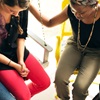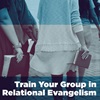This article is excerpted from our Training Tool Multiethnic Small Groups.
So in Christ Jesus you are all children of God through faith, for all of you who were baptized into Christ have clothed yourselves with Christ. There is neither Jew nor Gentile, neither slave nor free, nor is there male and female, for you are all one in Christ Jesus. If you belong to Christ, then you are Abraham's seed, and heirs according to the promise.—Galatians 3:23-29
All one in Christ Jesus. Really?
Sunday morning continues to be "one of the most segregated hours in American life, with more than 8 in 10 congregations made up of one predominant racial group," LifeWay recently reported. And if Sunday morning is this segregated, there's no doubt that Thursday night small groups are, too.
Despite being more than 50 years beyond the "I Have a Dream" speech from Dr. Martin Luther King, Jr., our churches and our small groups continue to gather relatively likeminded people who look and act alike.
That's a problem. Yet most aren't interested in changing it. In the same study, LifeWay found that 53 percent of churchgoers don't think their church should be more ethnically diverse.
We all lose when we gather only with people who look and act like us. Christena Cleveland, author of Disunity in Christ, explains:
When we meet Jesus around people who are just like us and then continue to follow Jesus with people who are just like us, we stifle our growth in Christ and open ourselves up to a world of division. However, when we're rubbing elbows in Christian fellowship with people who are different from us, we can learn from each other and grow more like Christ.
We don't often intend to gather in homogenous groups, but Cleveland maintains that "What begins as seemingly harmless homogeneity often snowballs into distrust, inaccurate perceptions of other groups, prejudice and hostility."
So if you currently have multiethnic groups or you're interested in starting some, I want to say, "Thank you."
Thank you for pursuing a fuller picture of the body of Christ.
Thank you for your willingness to be uncomfortable and to feel out of place as you pursue God's best.
Thank you for being humble enough to listen to the stories of those who are different from you.
Thank you for being a trailblazer in a time when racial issues tend to spark intense fires on both sides.
And I want you to know that there is hope. As Mark DeYmaz, pastor of Mosaic Church of Central Arkansas has pointed out, in the past, "most of the people who had written about the multiethnic church had been minority pastors, sociologists, and missiologists," with little interest from white pastors. Today, though, there are voices from every ethnic background joining the cause. The issue isn't simply a minority issue, but an issue for us all.
As people called by Jesus to usher in a new way, a new kingdom, we have an incredible opportunity. The world around us can't seem to figure out how to find unity in diversity—and we have the opportunity to show them how by unifying around the Person who draws us together. If we believe Paul's words that we "are all one in Christ Jesus," then our congregations and small groups should reflect that.
We must learn how to come together even when we don't all agree, even when we have different experiences, even when we have different ways of doing ministry. We have so much to learn from one another. Cleveland writes,
We need to adopt the belief that to be a follower of Christ means to care deeply about and pursue other followers of Christ, including the ones that we don't instinctively value or like. We need to adopt the belief that to be a follower of Christ means to allow our identity as members of the body of Christ to trump all other identities… . We've coped with our divisions long enough. It's time for us to discover our true identities as members of the family of God. It's time for us to rally around this identity, overcome our divisions, and change the world.
Can you imagine the compelling witness the church could have if we were willing to do the hard work of racial reconciliation and find unity in diversity? When we discover that we can learn so much from people from different backgrounds, our ministries will be stronger. When we learn how to truly listen to one another and discover our blind spots, we will be more Christlike. When we understand that others' issues are really issues for all of us, our impact on our culture will be immense. When we finally digest that there's no "us" and "them"—that it's only "us"—our witness will be unbelievably compelling.
What I've learned as I've talked to pastors of multiethnic churches is that healthy multiethnic ministry doesn't happen by accident—it's intentional. As Aaron Cho, assistant pastor of community life and formation at Quest Church in Seattle, says, even if your church talks about the importance of being multiethnic and you are multiethnic when you gather, "reconciliation has to get down to the level of relationship." We have to "encourage folks to carry on those conversations in their small groups."
Small groups are where the rubber hits the road. More than simply worshiping alongside people of various ethnicities on Sunday morning, multiethnic groups allow us to interact with people who are different from us, learn to really listen to others, and engage reconciliation at a personal, relational level. What can be accomplished in multiethnic small groups will fuel the health of a multiethnic church, and change people—person by person, relationship by relationship.
Multiethnic small groups won't be easy, but they are worth it. Thank you for being willing to engage people who are different from you. We won't always agree, and there will be tension. But my hope and prayer is that we will discover that in Christ we are one—beautiful differences and all.
This article is excerpted from our Training Tool Multiethnic Small Groups.
—Amy Jackson is managing editor of SmallGroups.com; copyright 2015 by Christianity Today.
Discuss
- What about multiethnic small groups excites you? What makes you nervous?
- Why are multiethnic small groups important for healthy congregations?
- How might we benefit from being in small groups with people who are different from us?










